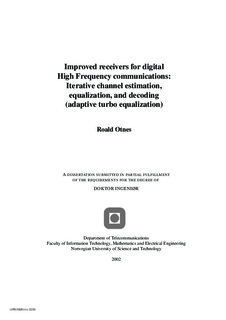Improved Receivers for Digital High Frequency Communications: Iterative Channel Estimation, Equalization, and Decoding (Adaptive Turbo Equalization)
Doctoral thesis
Permanent lenke
http://hdl.handle.net/11250/249838Utgivelsesdato
2002Metadata
Vis full innførselSammendrag
We address the problem of improving the throughput and the availability of digital communications in the High Frequency (HF, 3-30 MHz) band. In standardized military waveforms, the data is protected by an error-correcting code (ECC), and the code bits are shuffled by an interleaver and mapped onto a signal constellation for modulation onto a single carrier. Training sequences are multiplexed into the stream of transmitted symbols to aid the receiver in tracking the channel variations. The channel imposes severe time-varying intersymbol interference (ISI) as well as additive noise. Conventional receivers for such a system would first perform adaptive equalization (to mitigate the ISI) and symbol demapping, deinterleave the received code bits, and finally perform decoding, where the redundancy of the ECC is used to make high-quality decisions on the transmitted data bits even when bit errors have been introduced by the channel. Such a receiver is suboptimal because the equalizer does not make use of the redundancy introduced by the ECC, and is outperformed by an iterative scheme called turbo equalization. In turbo equalization, a.k.a. iterative equalization and decoding, soft information on the code bits is fed back from the decoder to the equalizer in an iterative fashion, and by performing the equalization and decoding tasks several times the bit error rates become significantly smaller than for a conventional “single-pass” receiver. Since we are dealing with an unknown time-varying channel, we must also perform channel estimation. We include channel estimation in the iterative loop of the turbo equalizer, using soft information fed back from the decoder as “training sequences” between the ordinary transmitted training sequences. Then, the receiver performs iterative channel estimation, equalization, and decoding, which can also be called adaptive turbo equalization. We have proposed a receiver using adaptive turbo equalization, and performed simulations using the MIL-STD-188-110 waveform at 2400 bps, transmitted over an ITU-R poor channel (a commonly used channel to test HF modems). We find that the proposed receiver outperforms a conventional receiver by 2-3 dB in terms of required signal-to-noise ratio to achieve a certain bit error rate. In this dissertation, we give an introduction to the fields of HF communications and standardized HF waveforms, channel modelling, and turbo equalization. We present an analysis of measured channel data to motivate our research in turbo equalization. We then present our research contributions to the field of turbo equalization: A low-complexity soft-in soft-out equalizer for time-varying channels, a comparative study of channel estimation algorithms using soft information as the input signal, and an investigation of adaptive turbo equalization using a technique known as EXIT charts. Finally, we present our main practical result, which is our proposed receiver and the corresponding simulation results.
